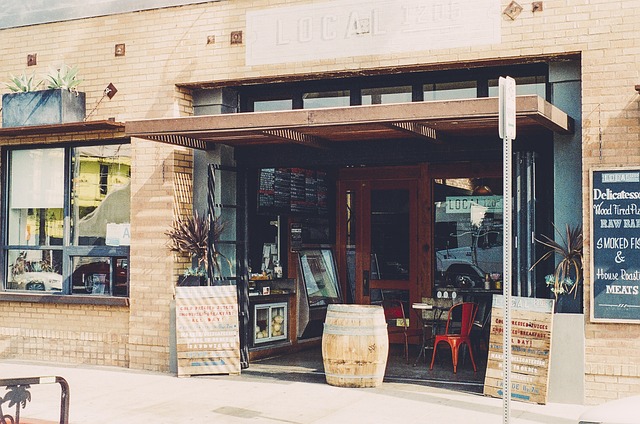Small businesses, particularly restaurants and retailers, cannot overlook Local SEO for Small Businesses in today's digital era. By optimizing for localized search results using tools like Google My Business, claiming local listings on platforms like Yelp and TripAdvisor, and crafting location-specific keywords, businesses can attract nearby customers and build trust. Effective Local SEO strategies convert curious searchers into loyal patrons, driving growth and success. Additionally, leveraging customer reviews, building a strong backlink profile, utilizing social media, and analyzing performance are crucial for staying competitive in the local business landscape. Staying up-to-date with future trends like voice search and user-generated content will further enhance Local SEO efforts.
Local SEO is a powerful tool for restaurants and retailers aiming to thrive in their communities. In today’s digital landscape, understanding local search algorithms and optimizing your online presence can drive foot traffic and boost sales. This article guides small businesses through essential Local SEO strategies, from mastering Google My Business and crafting localized content to leveraging customer reviews and social media engagement. Discover how to stay ahead of the curve with emerging trends shaping local search, ensuring your establishment remains a trusted destination for locals.
Understanding Local SEO: Why It Matters for Small Businesses

For small businesses, particularly restaurants and retailers, local SEO isn’t just a buzzword—it’s a survival strategy. In today’s digital age, potential customers turn to search engines like Google to find nearby dining options or shopping destinations. Optimizing for local search ensures your business appears at the top of these localized results, increasing visibility and attracting more foot traffic.
This is crucial because it helps foster relationships with the local community. By claiming and optimizing your Google My Business listing, responding to reviews, and incorporating location-specific keywords into your online content, you build trust and credibility with potential customers who are actively looking for businesses in their area. Ultimately, effective Local SEO for Small Businesses can turn curious searchers into loyal patrons, contributing to sustained growth and success.
Optimizing Your Online Presence: Google My Business and Local Listings

Optimizing your online presence is a crucial aspect of local SEO for small businesses, especially restaurants and retailers looking to attract nearby customers. Google My Business (GMB) is an indispensable tool in this regard, offering a direct line to potential patrons through search and Maps results. By claiming and verifying your GMB listing, you ensure your business information—including operating hours, menu details, and contact data—is accurate and easily accessible.
Additionally, leveraging local listings on other platforms like Yelp, TripAdvisor, or industry-specific directories can further enhance your visibility. These sites act as trusted sources for consumer reviews and recommendations, significantly influencing purchase decisions. Regularly updating content, responding to reviews, and encouraging satisfied customers to leave feedback on these platforms can boost your credibility and search rankings, making it easier for prospective diners or shoppers to find you when searching for local dining or retail options.
Crafting Compelling Local Keywords and Content

Crafting compelling local keywords is a critical step in optimizing your Local SEO for small businesses, especially for restaurants and retailers. Go beyond generic terms like ‘restaurant’ or ‘shop’ by incorporating specific locations, cuisines, or products. For example, ‘best Italian restaurant in [City Name]’ or ‘[Product Type] near me’ can attract customers searching for local options. Researching what your target audience actually searches for is key to creating relevant content that satisfies their needs and boosts your visibility on local search engines.
To create engaging content, tie these keywords into compelling narratives about your business. Highlight unique selling points like fresh, locally sourced ingredients or a warm and inviting atmosphere. Share customer testimonials, highlight seasonal specials, or offer exclusive promotions tailored to your neighborhood. By weaving your location and relevant products/services into captivating content, you not only enhance your Local SEO but also build a stronger connection with potential patrons.
Leveraging Customer Reviews to Build Trust and Visibility

In the competitive landscape of local business, customer reviews are a powerful tool for restaurants and retailers looking to enhance their Local SEO strategies. Positive reviews not only boost credibility but also act as social proof, encouraging prospective customers to choose them over competitors. Platforms like Google My Business, Yelp, and Facebook allow businesses to collect and display reviews, creating a sense of trust and transparency that is essential in the decision-making process of local consumers.
By actively monitoring and responding to customer feedback, eateries and retail stores demonstrate their commitment to providing excellent service. Addressing both positive and negative reviews shows potential patrons that the business values their input, fostering a connection that can lead to increased loyalty and repeat visits. This engagement also helps in improving online visibility as search engines often factor in review activity when ranking local businesses, making it a key component of any successful Local SEO campaign for small enterprises.
Building a Strong Local Backlink Profile

Building a robust local backlink profile is an integral part of successful Local SEO for Restaurants and Retailers, or any small business for that matter. These backlinks act as digital endorsements from reputable sources within your community, signaling to search engines that your business is credible and relevant. Focus on acquiring links from locally-focused websites, such as city blogs, news outlets, and neighborhood directories. This ensures that your backlink profile has a geographic relevance that aligns with your target audience.
Engage in partnership opportunities, sponsorships, or collaborations with other local businesses or community events to gain backlinks naturally. User-generated content, like customer reviews posted on Google My Business or Yelp, also contributes significantly to your local SEO efforts. Remember, the quality of these backlinks matters more than quantity; each should aim to enhance your business’s visibility and authority within its specific geographic niche.
Utilizing Social Media for Local Engagement and SEO

In today’s digital era, social media platforms offer powerful tools for local engagement and boosting Local SEO for small businesses like restaurants and retailers. By creating an active presence on popular channels such as Instagram, Facebook, and Twitter, businesses can directly connect with their target audience within a specific geographic area. Sharing visually appealing content featuring dishes, store ambiance, or community events not only attracts locals but also encourages them to interact and leave reviews—a crucial aspect of Local SEO.
Regularly posting about local promotions, seasonal offerings, or partnerships with nearby businesses further strengthens this connection. Engaging with followers through contests, polls, or direct messages fosters a sense of community, increasing customer loyalty and the likelihood of positive word-of-mouth recommendations. This organic reach can significantly enhance a restaurant’s or retailer’s online visibility, driving more local customers through effective Local SEO strategies.
Implementing Location-Based Marketing Strategies

Implementing location-based marketing strategies is a powerful way for restaurants and retailers to enhance their local SEO for small businesses. By focusing on strategies like Google My Business optimization, businesses can ensure their online presence aligns with their physical location. This includes accurately listing business hours, menu items (for restaurants), product details (for retailers), and providing high-quality images that reflect the establishment’s atmosphere.
Additionally, leveraging local keywords and reviews can significantly boost visibility in search engine results. Engaging with customers through online review platforms fosters trust and encourages word-of-mouth marketing, which is invaluable for local businesses. These strategies not only improve a restaurant or retailer’s ranking in local search but also create a more engaging and authentic connection with their target audience.
Analyzing and Tracking Your Local SEO Performance

Analyzing and tracking your local SEO performance is crucial for any restaurant or retailer aiming to thrive in a competitive market. Start by assessing your Google My Business (GMB) profile, ensuring all information is accurate and up-to-date. This includes correct business hours, contact details, and high-quality images that reflect your brand’s ambiance. Regularly monitor customer reviews, responding promptly to both positive feedback and constructive criticism, as this not only improves your online reputation but also signals to search engines that your business is engaged with its community.
Leverage Google Analytics to gain deeper insights into how potential customers are interacting with your website and local listings. Track key metrics such as click-through rates (CTR), conversion rates, and average session duration. Identify any performance gaps and adjust your Local SEO strategy accordingly, focusing on optimizing for relevant keywords that potential diners or shoppers might use when searching for businesses like yours in your area.
Staying Ahead: Trends Shaping Local Search in the Future

As we peer into the future of local search, several trends are shaping the landscape for small businesses, particularly restaurants and retailers. The rise of voice search assistants like Siri and Alexa means that consumers are increasingly using natural language queries to find nearby establishments. Optimizing your Google Business Profile (formerly Google My Business) listing with relevant keywords and ensuring accurate information is crucial for capturing these voice-activated searches.
Another significant trend is the integration of online reviews into local SEO strategies. With more users relying on Yelp, TripAdvisor, and other review platforms to make purchasing decisions, fostering positive reviews and encouraging customers to share their experiences can significantly boost your online visibility. Moreover, as social media continues to evolve, user-generated content will play an even greater role in shaping local search rankings, providing opportunities for businesses to leverage hashtags, location tags, and engaging visuals to attract new patrons.
